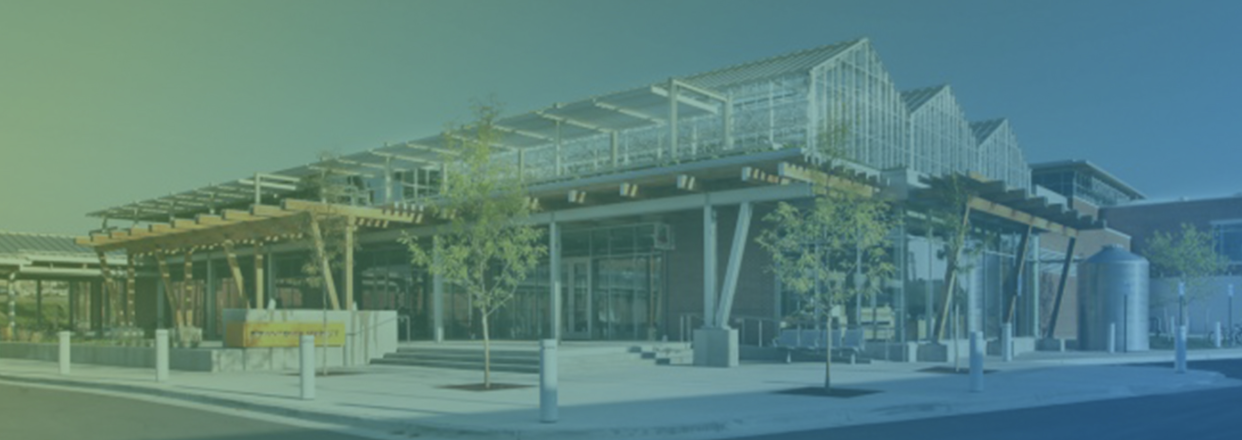
obs Downtown Market: A GSI Showcase
August 29, 2019
The Grand Rapids Downtown Market is a model for efficient water usage and stormwater management. Designed in 2012 by Fishbeck, Thompson, Carr & Huber (FTC&H), stormwater infrastructure was a top design priority for the Market, helping it to earn LEED Gold certification, one of the first LEED-certified urban markets in the nation.
The property, which includes a 132,000-square-foot building, parking lot and market structure, is located in the Lower Grand River Watershed with direct drainage to the Grand River in downtown Grand Rapids. A rain garden in the parking lot is planted with native plants such as purple coneflower, black-eyed susans and common milkweed, plants that have deep root systems capable of infiltrating and holding large amounts of stormwater, thus acting as a critical bioretention area. While it was challenging intially to establish the rain garden, because of invasive plants and weeds, the garden is now holding its own thanks to increased maintenance and replacing plant species.
The north parking lot is constructed with permeable pavement with a stone basin that acts as a catch basin. The streetscape on Ionia Avenue is lined with trees that soak up runoff through their roots and hold water on their leaves, which evapotranspirate back into the air. These trees are also designed with a planter bed that waters the trees. On top of the building are two green roofs that mitigate stormwater runoff. Vegetation on the roofs act as a sponge that soaks up rain water, as well as pulling in air pollutants and releasing oxygen into the air.
Green Roofs mitigate storm water runoff, soak up rainwater, filter air pollutants, and supply oxygen.
A 4,000-gallon cistern waters entire green house
There are a multitude of green spaces inside the building, including a year-round greenhouse on the second floor, and several plant LiveWalls, which are complete with their own unique drip irrigation system. The green house is watered entirely by a 4,000-gallon cistern that stores overflowing rain on the roof. The water is filtered and then pumped back into the market to water the greenhouse plants through an overhead watering system.
“When it comes to water, we make sure no drop is wasted,” said Steve Teitsma, formerly of FTC&H, who helped with the design and implementation of the market’s stormwater infrastructure.
The Market was built on a brownfield site, contaminated from years of industrial dumping. Before construction could begin, the groundwater around the site was pumped into the nearby sewer facility to go through a process of remediation and monitoring before the site was deemed clean enough to build on.
Though financial barriers are often considerable, Teitsma urges other businesses to think about the bigger picture when facing stormwater runoff challenges, such as improvements to the environment and long-term payoffs. He advocates for changes in policy to incentivize green infrastructure and ordinances to enforce infiltration at the site.
“Infiltrating stormwater where it falls is critical in helping to maintain good water quality down the line,” Teistma said.
The building received an American Institute of Architects award in 2015 and is recognized by Architectural Records with a “Good Design is Good Business” award.
The Grand Rapids Downtown Market is a mixed-use facility that brings together local food production, education, and entrepreneurship opportunities. Our indoor facility features a 20+ vendor market hall with two full-service restaurants, while dozens of artisans line our outdoor market shed during special events. We offer several exceptional spaces throughout the site, including a rentable Incubator Kitchen, rooftop greenhouses, and the nation’s first kid-friendly demonstration kitchen (you have to see it to believe it). The Market is LEED Gold certified, features a green roof, live walls, geotherm wells, a rain garden, and plenty of other innovative, sustainable features.
We wanted our Market’s location to serve as a focal point within the city while revitalizing a previously neglected area. The Market continues to spark redevelopment of nearby properties while reintroducing community neighbors to a once underutilized Grand Rapids locale.
